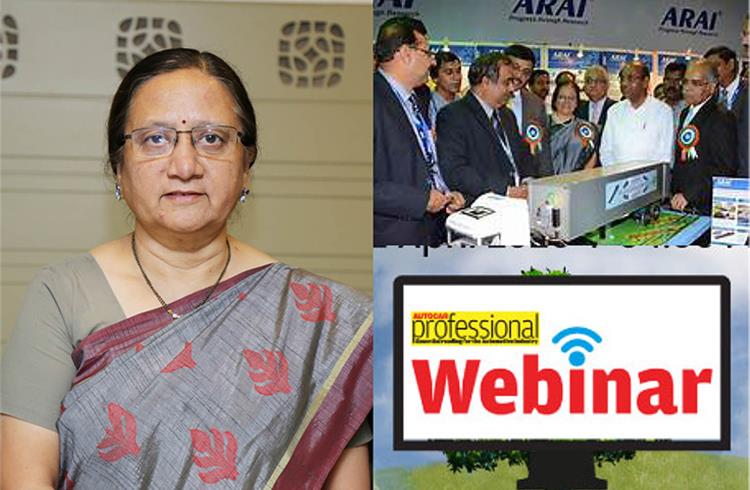ARAI's Rashmi Urdhwareshe: ‘India needs more testing centres, dismantling standards and a scrappage policy.'
The Director of the Automotive Research Association of India pushes for a scrappage policy as well as norms for breaking down vehicles, while also calling for repair and maintenance centres for EVs.
As the world celebrated the 50th anniversary of ‘World Earth Day’ this year yesterday, the focus across the mobility world is shifting towards sustainable and environmentally friendly variants. The role of the government and its various departments is crucial too. Autocar Professional in its webinar on 'Driving towards a Greener, More Sustainable Auto Industry' on April 22 sought to address all these issues in a comprehensive way.

Rashmi Urdhwareshe, Director at Automotive Research Association of India (ARAI), was one of the four panellists. Last month, on International Women's Day, she was conferred the 2019 Nari Shakti Puraskar by the President of India. The Nari Shakti Puraskar, instituted by the Ministry of Women and Child Development, is a 'National Award in recognition of exceptional work for women empowerment'.
An Autocar Professional News Maker of 2019, she has literally broken the glass ceiling in the male-dominated Indian automotive industry and her contribution towards developing new emission regulations in the country has been laudatory. She believes that though recent transition to BS VI emission norms in record time is something to cheer about, a lot more needs to be done going forward in this direction.
According to Urdhwareshe, “ Sustainable transportation for India needs research in three key areas of vehicle technology (powertrain design changes), alternate fuel (assessment for emission, vehicle performance and material compatibility) and operational driving pattern (laboratory simulation)."
ARAI, which is a prime testing and certification agency under Ministry of Heavy Industries and Public Enterprises, has been playing a critical role in cerfifying safe, efficient and less polluting vehicles on Indian roads since past several decades. The agency’s mandate is to work on regulatory frameworks, enforcing guidelines and formulating standardisation, certification and type approvals, Research and Development (R&D) among others.
The road ahead
Urdhwareshe pointed out that the integrated approach for clean air in the automotive sector involves government policies and incentives, road/public infrastructure, fuel/energy management, regulations and standards, vehicular technology solutions and control of in use vehicles.
According to Urdhwareshe, the approach needs to tackle real emission on roads as firmly as emission in the testing labs, “An air quality management planning study indicates a need for fleet modernisation and migration to BS VI. That has already started but reducing the real emission levels and improving road infrastructure are critical.”
She emphasised the need for a strategic approach towards embracing green mobility and the challenges for the EV segment. “India needs more testing centres. Dismantling standards and a scrappage policy need to be firmed up further. As regards eco-system development for EV initiatives, the government needs to work in this direction along with taking steps for active work in repair and maintenance of EVs as well,” she added.
Urdhwareshe’s observations come even as Indian automotive industry braces for its steepest decline over the past several decades. The scrappage policy, which is said to awaiting Cabinet approval, should help the much-needed push to sales as well as revive demand, apart from reducing the pollution levels emanating out of old vehicles which still ply Indian roads.
On being asked about the role of LNG / bio-LNG as a cleaner alternative, Urdhwareshe said both are “suitable for goods and long-haul carriage, but distribution remains a challenge”. She added that LNG-fueled trucks are being tried on certain corridors of the country, wherein the infrastructure has been developed. Interestingly, LNG usage has received impetus in recent months, as India’s leading energy giants have begun working on setting up liquefied natural gas (LNG) pumps along the country's golden quadrilateral highways. About 350 LNG pumps at the cost of around Rs 3,000-3,500 crore, are needed to cover the entire project.
Urdhwareshe, who has over 35 years of experience in the automotive industry, seems fairly optimistic about the transition towards green mobility in India. She signed off by saving, “Together with all the stakeholders, the automotive industry will come out of the environmental and energy challenges.”
READ MORE
Scrappage policy vital to charge India's eco-friendly mission: Experts at Earth Day webinar
Maruti Suzuki's CV Raman: ‘Change in buying patterns likely once the lockdown ends.'
Toyota Kirloskar Motor's Shekar Viswanathan bats for scrappage policy, EVs
Hero Electric's Naveen Munjal: 'Lockdown may open up opportunities for EVs.'
RELATED ARTICLES
Bosch hydrogen engine tech-powered truck to be on Indian roads this year
The global supplier of technology and services is betting big on both electromobility and hydrogen. While announcing the...
IIT Bombay inaugurates Arun Firodia Research Floor
IIT Bombay, one of India’s top technical and research institutions, honours Kinetic Group chairman Dr Arun Firodia, one ...
Maruti Suzuki expands capacity at Manesar plant by additional 100,000 units
New assembly line at Plant A expands total manufacturing capacity at the Manesar plants to 900,000 units per annum. Alon...





 23 Apr 2020
23 Apr 2020
 6388 Views
6388 Views





 Autocar Pro News Desk
Autocar Pro News Desk




